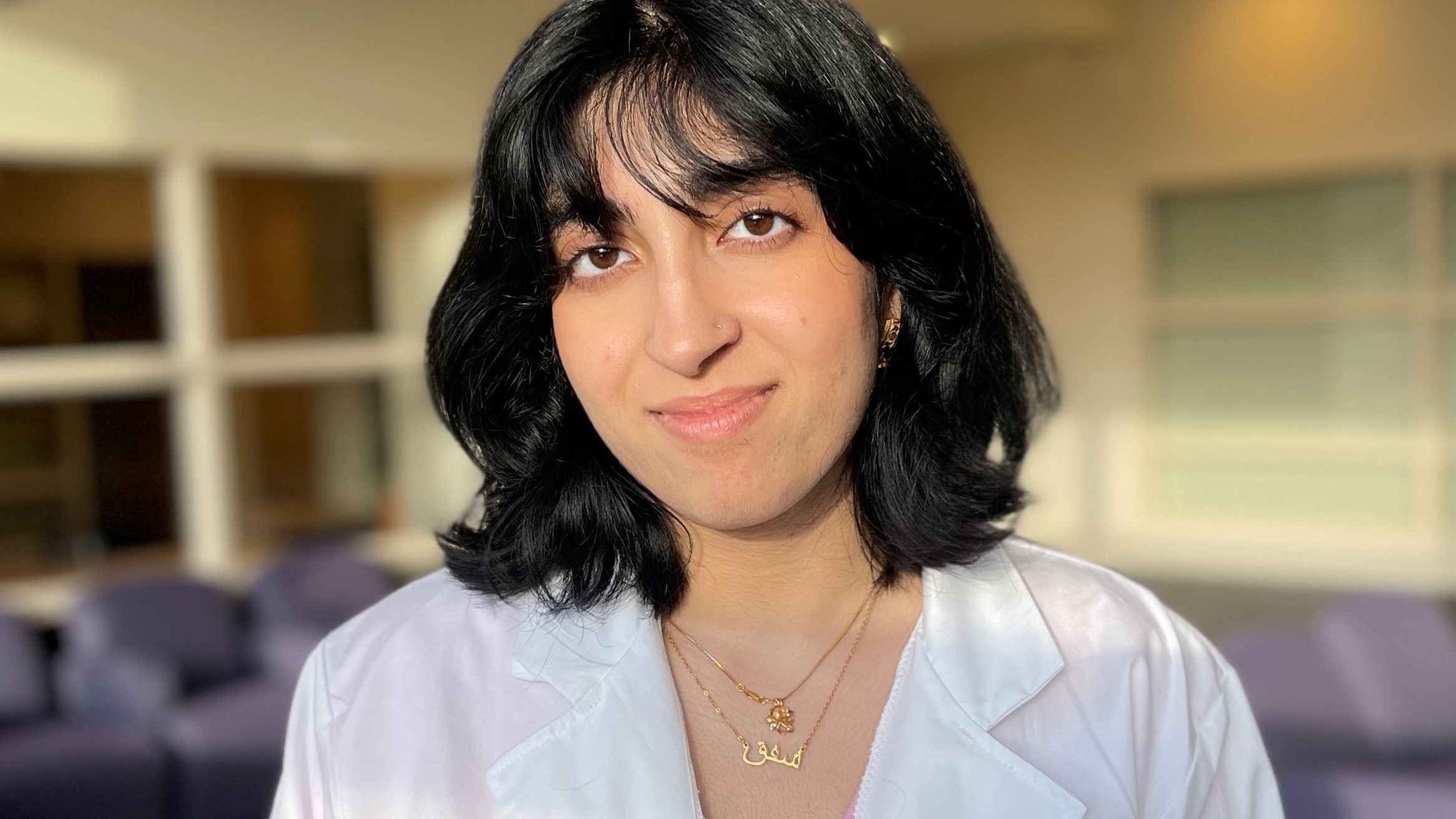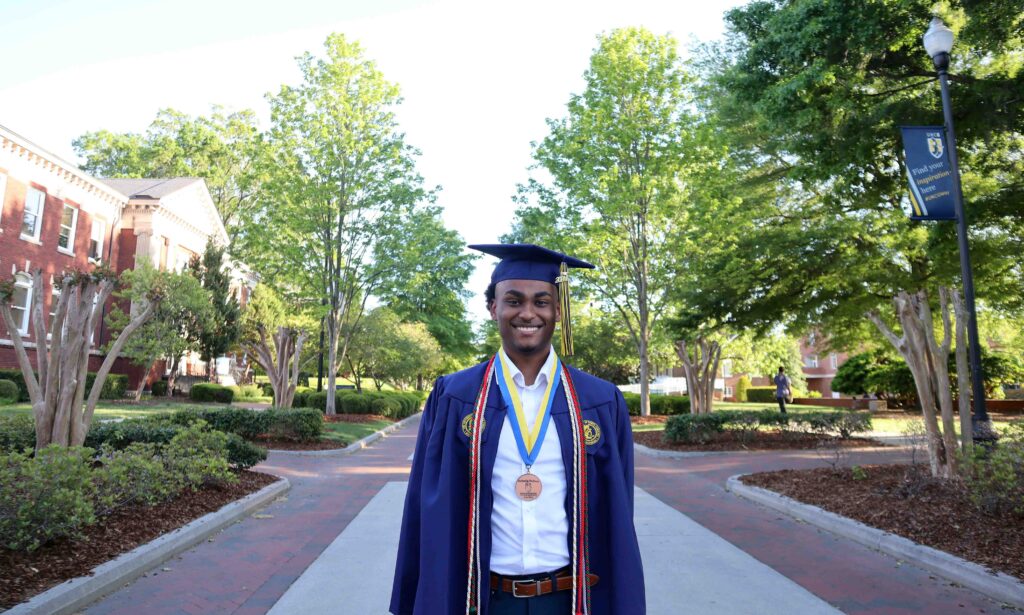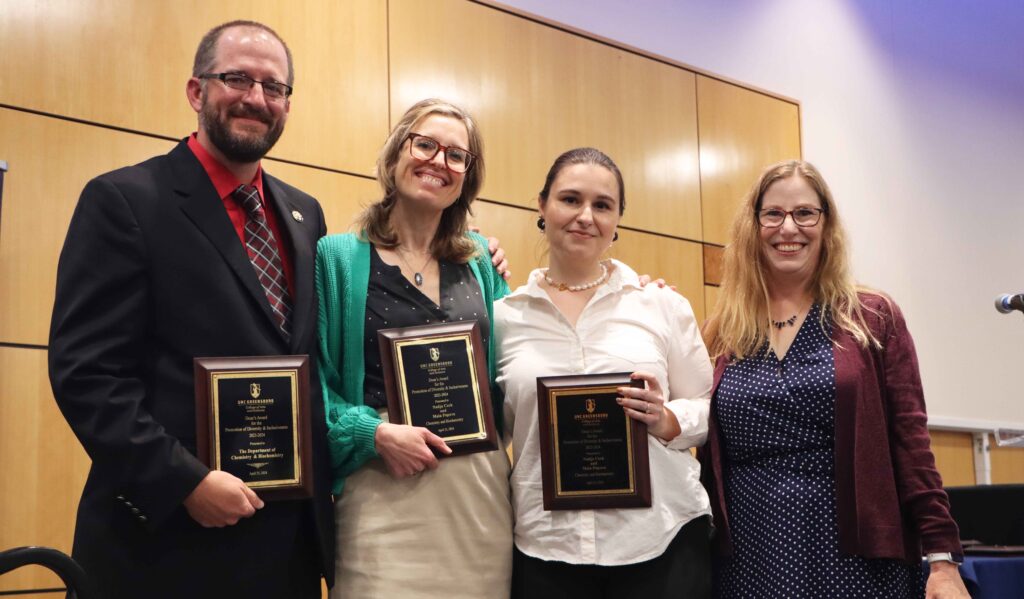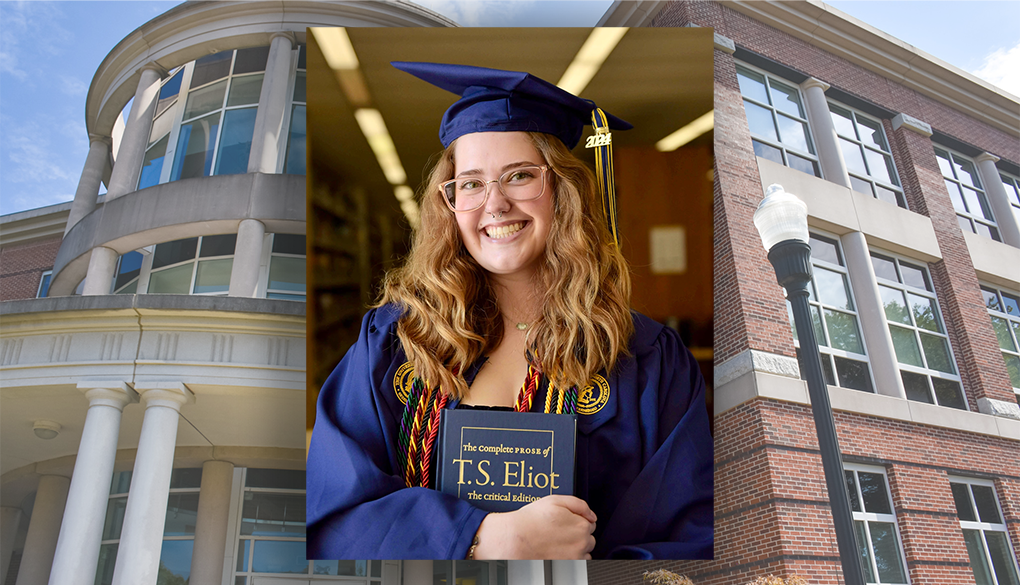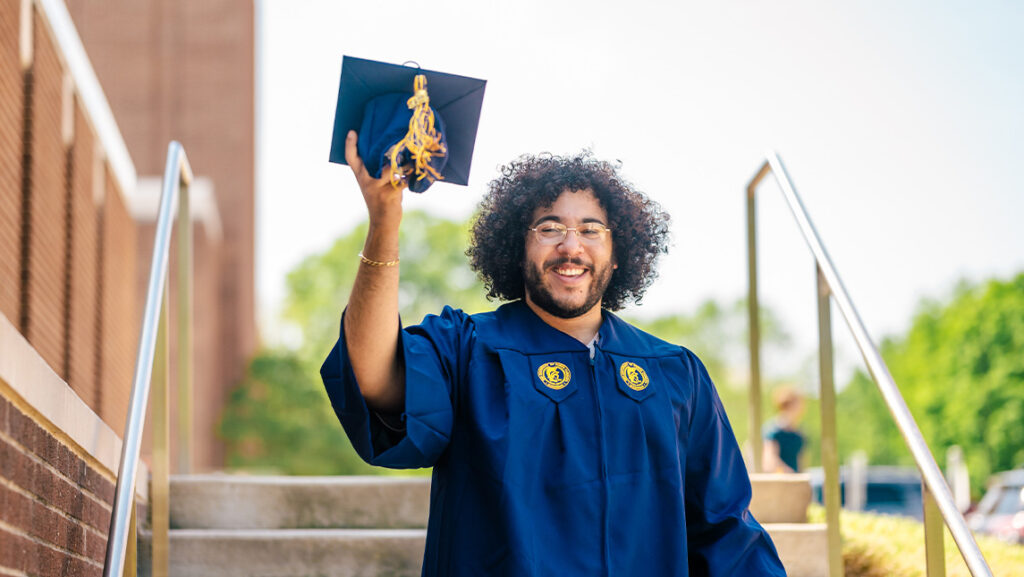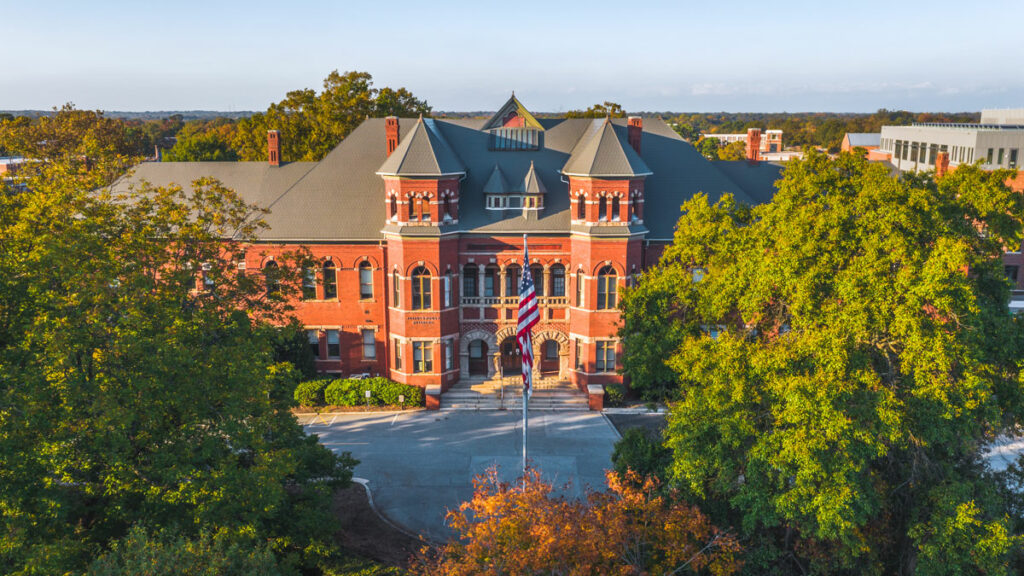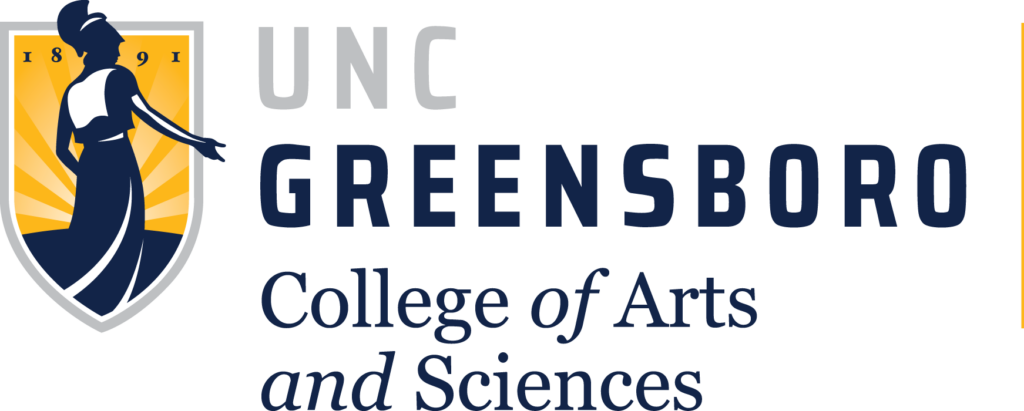Last fall, the College of Arts & Sciences Office of Research supported several undergraduate students with grants from the Dorothy Levis Munroe Undergraduate Research Fund. Munroe, who graduated as a chemistry major from UNCG in 1944, was a high school teacher and became the first woman to serve on the board of education in Newark, Delaware. In her later years, Munroe endowed a fund at UNCG to help students pursue the sciences by providing resources for research. Our first Munroe recipient profile is of Shafaq Ahmed, a December 2023 graduate.
When Shafaq Ahmed started her first year as an undergraduate student at UNCG, she was no stranger to the campus. She’d been here the four years prior as a student of the Middle College at UNCG.
“I spent a long time on UNCG’s campus,” she laughs.
But Ahmed was not at all familiar with what went on in a biology lab. “I hated biology when I was in high school,” she recalls. “I told myself I’d never major in biology.”
An intro level biology course changed that.
Now, after graduating in December 2022 with a Bachelor of Science degree in biology, Ahmed is starting a prestigious post-baccalaureate research fellowship at the NIH’s National Cancer Institute in Bethesda, Maryland. She will spend the next year or possibly two conducting cancer research, applying skills and knowledge she gained through her undergraduate lab work.
That intro level course was taught by Professor Maria Christina Moreira, who has since retired, and the lab section was led by a graduate student. The lab experience especially was new for Ahmed, and it made an impression on her.
“I really loved the lab,” she says. “I loved being able to apply what I learned, to work with my hands, to do cool mad scientist experiments … Classes are not easy for anyone; it’s more fun to do experiments.”
Ahmed went to her instructor to ask how she could do more research, and she began to pursue research positions on campus.
Then … COVID happened, and in-person lab work was not an option.
For Ahmed, the missed opportunity presented a new possibility. When UNCG returned to hybrid and in-person classes, she applied for an opening in Dr. Zhenquan Jia’s molecular toxicology lab. At the time, the lab was focused on possible novel therapies for cardiovascular disease, and Ahmed felt connected to the topic, since people in her family had suffered from related conditions.
In Jia’s lab, Ahmed conducted experiments to see if a new class of particles called Carbon Nanodots (CNDs) could reduce inflammation associated with atherosclerosis, a main cause of cardiovascular disease. Prior research has shown the impact of CNDs in vitro, but this project would examine their effect in vivo – in live animals. The team used mice that had been genetically modified to lack Apolipoprotein E (ApoE), a major lipid transporter that allows “bad” LDL cholesterol to be transported throughout the body. Without ApoE to disperse it, the bad cholesterol builds up, resulting in atherosclerosis. Experiments using these “ApoE knockout” mice would help the team understand the effect of CNDs on inflammation in bodies with atherosclerosis.
Ahmed was involved in several related experiments in the Jia Lab exploring the effect of CNDs in ApoE knockout mice. Her most recent independent research project, for which she received the Munroe grant, focused on tissue of the aortic vessels, which carry blood from the heart to the rest of the body. Ahmed would examine tissue samples for evidence of expression of pro-inflammatory genes, a multi-step process that would begin with isolating RNA from the samples and eventually conclude with real-time PCR analysis to identify targeted genes.
Eventually, this research could lead to treatments for humans at risk of or suffering from heart disease, though Ahmed has learned science takes time.
“This carbon nanodot research is great, and it’s very groundbreaking, but it’s going to take a long time before we ever see it in a pharmacy, if it even gets to that point.”
Knowing her research could eventually improve people’s lives is important to Ahmed. “Research is helping people,” she says. “Research is hope.”
But she also gets satisfaction from seeing the results of experiments happening in the here and now.
“I like seeing the lines, and if they’re all close together that’s really good, and if they’re not, I’ll think, ok, maybe I should work on my pipetting or something,” she says. She goes on to explain: “A PCR machine shows you this graph, which shows the lines of the genes being expressed. When you are pipetting, you want all of the pipetting to be as accurate as possible because that will give you good results. It’s very hard to get good results, so you have to be patient, but it’s rewarding when you do.”
The Munroe grant provided $994 to purchase materials, chemicals, and reagents needed to conduct the RNA isolation and PCR analysis. Though Ahmed was not able to complete her project before graduation, she trained other undergraduates who are continuing the experiment as part of the Jia Lab.
And that’s the other thing Ahmed enjoyed about her undergraduate research experience: the teamwork and collaboration.
“One of my favorite things is when we’re all in lab together and doing our own experiments. It’s kind of hectic, but it’s also fun because we’re bantering with each other, talking about each other’s projects, sharing ideas …The research that I did is something that I’m continuing from other people’s research and people are continuing it after me. There are so many people involved in these things.”
For other undergraduates who are thinking about getting involved in research, Ahmed has some advice.
“I never thought I would like research even though I liked the bio lab. I hear this from my friends: ‘Oh, do I have to come up with my own ideas? What if I don’t have any ideas?’ Honestly, as an undergrad you’re going to be given your project. You’re not a PhD student. We’re still learning as students, and this is for us to learn how research works. If you don’t like it, that’s okay. You can just leave it. You don’t have to be in research. But if you love it, you can keep doing it. Don’t knock it before you try it.”
Don’t knock it before you try it. So far, it’s an approach that’s working for her.
Photo credit: Shafaq Ahmed
